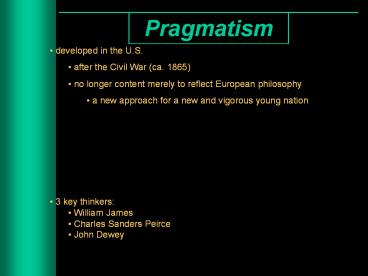Pragmatism - PowerPoint PPT Presentation
1 / 13
Title:
Pragmatism
Description:
... and use your knowledge of the sun's position, the direction you've been going, previous info. ... in avoiding becoming a midnite snack for Smokey the Bear ... – PowerPoint PPT presentation
Number of Views:1033
Avg rating:3.0/5.0
Title: Pragmatism
1
Pragmatism
- developed in the U.S.
- after the Civil War (ca. 1865)
- no longer content merely to reflect European
philosophy - a new approach for a new and vigorous young
nation
- 3 key thinkers
- William James
- Charles Sanders Peirce
- John Dewey
2
William James (1842-1910)
- trained first as a medical
- doctor, then a psychologist
- finally became a philosopher
- and the chief advocate of
- Pragmatism
- James shared the American distrust of purely
theoretical or intellectual activity, and asked
What is the point of theorizing? What difference
does it make? Why is it important to bother with
the mind games of theorists?
3
What is Pragmatism?
- It is
- a method for evaluating intellectual problems,
and - a theory about the kinds of knowledge we are
capable of acquiring.
- The Starting Point
- Before determining if any given philosophical
- claim is true, James thought it first
necessary - to determine the cash-value of the claim.
4
Cash-Value
- The cash-value of our ideas is to be found
in the use to which they can be put.
- With regard to any theory, we can ask what
difference it would make if I believed it, and
what consequences it would have for my behaviour - If it would not make the slightest difference
whether I believed a theory to be true, and it
had no effect on my actions at all, then the
theorys cash-value would be zero the theory
is useless
5
- Theories ought to be judged, then, in terms of
their success at helping us solve problems --
they are the instruments we use. - Suppose you get lost in the woods, and use your
knowledge of the suns position, the direction
youve been going, previous info. about the
terrain, etc., to develop a theory about how to
find yourself again. - the cash-value of your theory will be judged
according to your success in avoiding becoming a
midnite snack for Smokey the Bear
6
- By contrast, many classical philosophical
theories have little or no cash-value. - What difference does it make if you believe (or
disbelieve) that the universe is really only one
vast mind? - It would change none of the daily problems you
face, and give you no clues about how to resolve
them. - At best, such a metaphysical belief might make
you a little bit happier (or sadder, if you
disbelieved) beyond that, it has almost no
cash-value.
7
- Reflections like these led James to a simple
conclusion - A theory is true if it works.
- Traditional (rationalist) philosophers like
Plato held that the truth of ideas is not
dependent on human experience -- an idea is true
or false whether anyone knows it or not. - James argued that the only meaningful way to
gauge the truth of an idea is to see whether it
works. - claims about absolute, objective truth are
meaningless, since they can never be proven by
experience
8
Pragmatic Truth
- For a pragmatist, then, truth isnt something
- a idea has -- it is something that happens
- to an idea.
- Before you discover whether an idea, theory, or
belief works, it is neither true nor false. - As you test out the theory or idea, it becomes
true or false, or more true or less true. - In other words, truth is not something static
and unchangeable -- it grows and develops with
time.
9
- This view of truth fits quite well with modern
science, which progresses by means of
experimental trial error through a succession
of increasingly accurate theories. - Newton, for example, worked out the laws of
motion, and for centuries his theories were
considered true because they worked. - When Einstein showed that the classical laws of
physics didnt quite work in certain situations
(esp. as one approaches the speed of light), our
understanding of the truth about motion changed.
10
Pragmatism and Ethics
- For the pragmatist there is no fixed world
- to be revealed by experience there is only a
- continuous quest to find workable solutions to
- lifes problems.
- The way to discover what is morally right or
wrong is the same as when seeking truth a good
action is one that works to solve a given
problem. - e.g. Is the right way to solve ones money
problems to rob a bank?
11
- Presumably, one pragmatist would consider all
the possible unsatisfactory consequences for
oneself and others (i.e. imprisonment) and
conclude that bank robbery is the wrong
solution. - On the other hand, another might just as readily
conclude the solution is right -- IF they get
away with the crime.
- Clearly, then, pragmatism offers no absolute
- moral principles -- the good is what
- works, and judging this involves a purely
- subjective evaluation.
12
Criticisms
- At what point can you tell whether an idea
- has worked?
- Some pragmatists respond that you must look to
the long-term consequences, but - those consequences may go on forever
- the idea might work only sometimes
- We need some criteria, a moral framework but
this is just what pragmatism tells us we cant
have (because its meaningless) . - There is a danger of falling into a morality
based on personal preference (Well, it works for
me!).
13
Source Popkin, R.H. and Stroll, A. Philosophy
Made Simple. New York, Doubleday, 1993. See
chapter 1.

